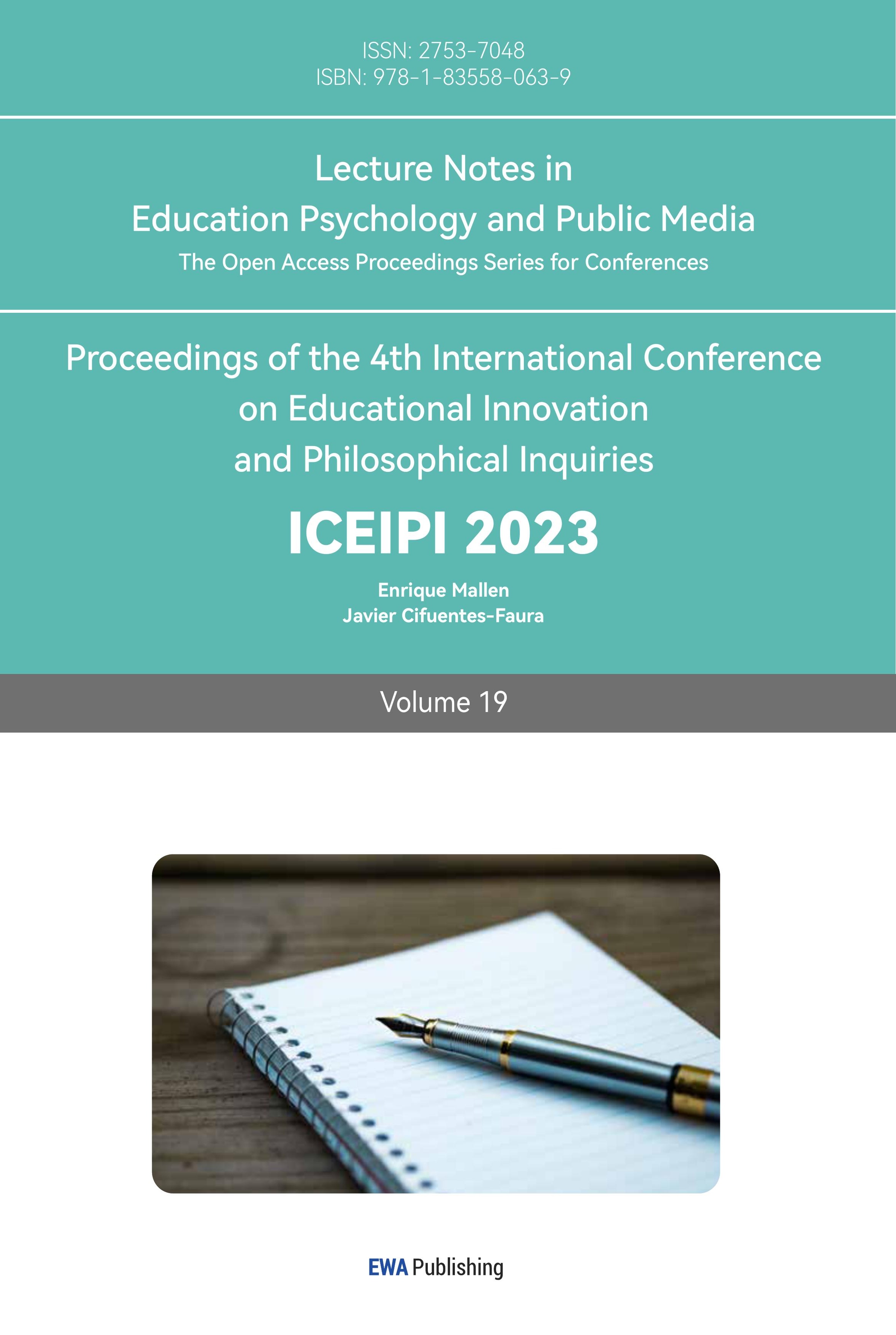References
[1]. Li Qinhua. A new exploration of teaching core literacy in academic subjects: Taking primary school English as an example [J]. Shanghai Educational Research,0(3):93-95(2017).
[2]. Zhao Jing. Research on the application of game-based learning concept in higher vocational English teaching [J]. Journal of Beijing City College,0(3):87-92(2017).
[3]. Li Qing. An introduction to the application of classroom games in primary school English teaching [J]. Shaanxi Education: Teaching, (1):126-126(2013).
[4]. Zhang Wei, Dai Zheng. An analysis of the role of educational games in promoting learning - from the motivational system of learning [J]. Journal of Chongqing University of Posts and Telecommunications: Social Science Edition, (S1):59-61(2008).
[5]. Liu Dan, Li Hongxiao. The connotation, value and generation of ecological classroom [J]. Journal of Corps Education College, 28(3):49-5262(2018).
[6]. Xia Zhixia. How to cultivate students' interest in learning in English teaching [J]. Essay Writing Guide for Secondary School Students. (30):0098-0098(2020).
[7]. Cai Lei. Activating classroom teaching with games [J]. Primary school teaching reference: comprehensive version, (8):57-58(2014).
[8]. Ding Ling. A brief discussion of English interest teaching [J]. Curriculum materials teaching research: primary education research,0(1):61-63(2017).
[9]. Lin Zhengjun. English teaching in primary and secondary schools based on the view of embodied language [J]. Curriculum. Teaching materials. Teaching Method, 42(2):95-101(2022).
[10]. Zheng Chengzhou. Exploring the strategy of teaching English gamification in primary schools [J]. Academic Weekly, (12):112-114(2022).
[11]. Zhang Xiaoling, Li Yuehua. Investigation and reflection on the teaching of English games in primary schools [J]. Journal of Xiaogan College, 24(4):100-103(2004).
[12]. Sun Yunli. Analysis of the problems and countermeasures of game teaching in primary school English classroom [J]. English Square: academic research,0(4):138-139(2018).
[13]. Liu Rongyan. Enhancing the participation of "disadvantaged groups" in cooperative learning [J]. Primary School Science: Teachers, (9):99-99(2020).
[14]. Liu Weiqin, Meng Bin. The application strategy of game teaching method in primary school English teaching [J]. Overseas English, (4):164-166(2022).
[15]. Jin Xiuli. The application of game teaching method in primary school English teaching [J]. Tianjin Education, (8):100-101(2021).
Cite this article
Geng,Z. (2023). Exploring the Organic Integration of Games and English Education in Upper Primary School. Lecture Notes in Education Psychology and Public Media,19,21-26.
Data availability
The datasets used and/or analyzed during the current study will be available from the authors upon reasonable request.
Disclaimer/Publisher's Note
The statements, opinions and data contained in all publications are solely those of the individual author(s) and contributor(s) and not of EWA Publishing and/or the editor(s). EWA Publishing and/or the editor(s) disclaim responsibility for any injury to people or property resulting from any ideas, methods, instructions or products referred to in the content.
About volume
Volume title: Proceedings of the 4th International Conference on Educational Innovation and Philosophical Inquiries
© 2024 by the author(s). Licensee EWA Publishing, Oxford, UK. This article is an open access article distributed under the terms and
conditions of the Creative Commons Attribution (CC BY) license. Authors who
publish this series agree to the following terms:
1. Authors retain copyright and grant the series right of first publication with the work simultaneously licensed under a Creative Commons
Attribution License that allows others to share the work with an acknowledgment of the work's authorship and initial publication in this
series.
2. Authors are able to enter into separate, additional contractual arrangements for the non-exclusive distribution of the series's published
version of the work (e.g., post it to an institutional repository or publish it in a book), with an acknowledgment of its initial
publication in this series.
3. Authors are permitted and encouraged to post their work online (e.g., in institutional repositories or on their website) prior to and
during the submission process, as it can lead to productive exchanges, as well as earlier and greater citation of published work (See
Open access policy for details).
References
[1]. Li Qinhua. A new exploration of teaching core literacy in academic subjects: Taking primary school English as an example [J]. Shanghai Educational Research,0(3):93-95(2017).
[2]. Zhao Jing. Research on the application of game-based learning concept in higher vocational English teaching [J]. Journal of Beijing City College,0(3):87-92(2017).
[3]. Li Qing. An introduction to the application of classroom games in primary school English teaching [J]. Shaanxi Education: Teaching, (1):126-126(2013).
[4]. Zhang Wei, Dai Zheng. An analysis of the role of educational games in promoting learning - from the motivational system of learning [J]. Journal of Chongqing University of Posts and Telecommunications: Social Science Edition, (S1):59-61(2008).
[5]. Liu Dan, Li Hongxiao. The connotation, value and generation of ecological classroom [J]. Journal of Corps Education College, 28(3):49-5262(2018).
[6]. Xia Zhixia. How to cultivate students' interest in learning in English teaching [J]. Essay Writing Guide for Secondary School Students. (30):0098-0098(2020).
[7]. Cai Lei. Activating classroom teaching with games [J]. Primary school teaching reference: comprehensive version, (8):57-58(2014).
[8]. Ding Ling. A brief discussion of English interest teaching [J]. Curriculum materials teaching research: primary education research,0(1):61-63(2017).
[9]. Lin Zhengjun. English teaching in primary and secondary schools based on the view of embodied language [J]. Curriculum. Teaching materials. Teaching Method, 42(2):95-101(2022).
[10]. Zheng Chengzhou. Exploring the strategy of teaching English gamification in primary schools [J]. Academic Weekly, (12):112-114(2022).
[11]. Zhang Xiaoling, Li Yuehua. Investigation and reflection on the teaching of English games in primary schools [J]. Journal of Xiaogan College, 24(4):100-103(2004).
[12]. Sun Yunli. Analysis of the problems and countermeasures of game teaching in primary school English classroom [J]. English Square: academic research,0(4):138-139(2018).
[13]. Liu Rongyan. Enhancing the participation of "disadvantaged groups" in cooperative learning [J]. Primary School Science: Teachers, (9):99-99(2020).
[14]. Liu Weiqin, Meng Bin. The application strategy of game teaching method in primary school English teaching [J]. Overseas English, (4):164-166(2022).
[15]. Jin Xiuli. The application of game teaching method in primary school English teaching [J]. Tianjin Education, (8):100-101(2021).









